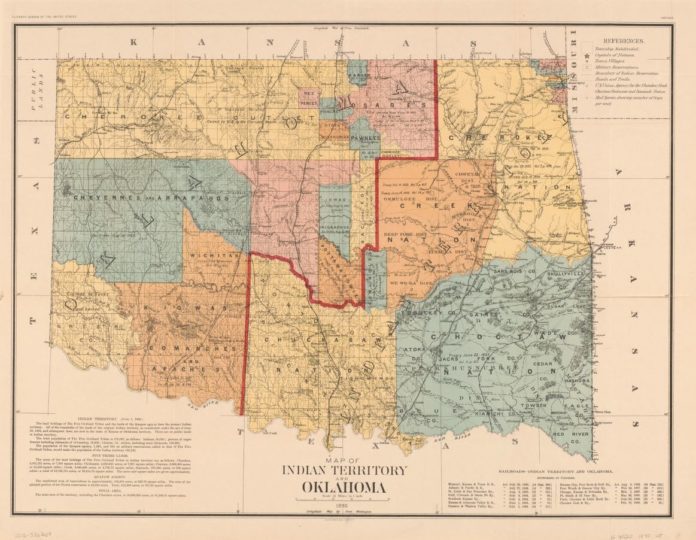BY CHUCK HOSKIN JR.
 July 9 marks the one-year anniversary of the historic McGirt ruling by the United States Supreme Court. A year later, our efforts to protect the Cherokee Nation Reservation, in the face of assault by opponents of tribal sovereignty, is stronger than ever.
July 9 marks the one-year anniversary of the historic McGirt ruling by the United States Supreme Court. A year later, our efforts to protect the Cherokee Nation Reservation, in the face of assault by opponents of tribal sovereignty, is stronger than ever.
Writing the majority opinion, Justice Neil Gorsuch wrote, “on the far end of the trail was a promise,” referring to a promise made by the United States to the Creek Nation in its 19th century removal treaty. Even the imposition of the state of Oklahoma over tribal lands, the dismantling of tribal governmental institutions, allotment of land and the erosion of the civic fabric of tribes was, the court said, “not enough for the United States to break that promise.”
Treaties promised us that we, the tribes – not the state – have authority over our reservation lands, including prosecuting major crimes that occur or those involving an Indian defendant or victim.
It was true then as it today that McGirt applies to all Five Tribes, all with similar relevant legal histories – Cherokee, Creek, Chickasaw, Choctaw and Seminole Nations. In March 2021, in the Hogner case, McGirt officially applied to the Cherokee Nation Reservation. This confirmed what Cherokee leaders have always known: That the Cherokee Nation Reservation promised exclusively to the Cherokee Nation is now, and has always been, our reservation. It was also a moment that called for strong Cherokee leadership.
Leadership means being proactive, not sitting around while events unfold around you. That’s why at Cherokee Nation we are prepared to take on the enormous challenges presented by McGirt and we are meeting those challenges daily. Even before the Supreme Court made its ruling, we began planning internally for what was to come and discussing potential impacts with state, federal and local officials.
In the wake of victory, we continue working and preparing. I empaneled the Cherokee Nation Sovereignty Commission, including representatives from all three branches of Cherokee Nation government. I have worked with the council to act on the commission’s recommendations, including dramatically increasing budgets to expand our criminal justice system and update our criminal codes to protect victims and hold lawbreakers accountable. We have hired more than a dozen new marshals and more prosecutors, judges and victim advocates. We are expanding court space so that we can bring centers of justice to our communities beyond our capital of Tahlequah. We will commit no less than $35 million per year in new dollars to build the largest criminal justice system in Oklahoma [other than the state of Oklahoma]. And we will do it better than the state of Oklahoma. After all: The Cherokee people and all who reside within our reservation deserve and expect excellence from our tribe and a blanket of protection over all who reside on our tribal lands.
We also prepared for a different, but familiar, challenge: The assault on McGirt by opponents of tribal sovereignty. Sitting back and waiting for these opponents to attack is a recipe for failure. I was not elected to fail the Cherokee people when it comes to protecting our sovereignty. So, we engaged early on to make clear that assaults on McGirt in Congress and elsewhere would not be tolerated.
Gov. Stitt and special interest groups have launched a campaign against McGirt using fear tactics. They are exploiting the understandable anxiety over the most dramatic change in Oklahoma’s criminal justice system in over a century. Cherokee Nation has endured attacks on our sovereignty from the moment of European contact.
As chief, I will not tolerate these attacks. We must stand our ground, but also steer the public debate away from conflict and towards collaboration between governments.
Leadership also means dealing honestly with the public based on the facts. That is what guides my administration and what distinguishes it from the “sky is falling” tactics of Gov. Stitt and other anti-sovereignty politicians.
The fact is, McGirt challenges Cherokee Nation to harness enormous resources in a matter of months what it took Oklahoma more than a century to do: Build a comprehensive criminal justice system for all.
The fact is, the rising costs of criminal justice means that in the future Cherokee leaders may need to make difficult budget decisions in order to meet all of our obligations and priorities from a finite pool of resources.
The fact is, federal law creates gaps in the justice system that must be addressed, including exclusively jurisdiction by the federal government over substantially all crimes where the offender is non-Indian and strict federal limits on sentencing criminals in tribal courts.
The fact is, with dozens of law enforcement agencies – state, county, federal and tribal – operating in a way that overlaps every minute of every day, a high degree of cooperation is needed.
The fact is, it is presently illegal for the state and the tribes to reach cooperative agreements on McGirt unless Congress reforms restrictive federal laws, as has been proposed by Congressman Tom Cole.
Dealing in these truths, rather than relying on political scare tactics, is the best path to seize the great opportunities presented by McGirt.
A year after McGirt, it remains the most important case in our lifetimes in support of tribal sovereignty in many generations. It means a promise made must be a promise kept. More than that, it means Cherokee Nation has an historic opportunity to build the best criminal justice system in the country.
Doing so requires proactive leadership, thoughtful discussion and a reliance on facts. Doing so means rejecting scare tactics designed to pit Indians against non-Indians and erode tribal sovereignty.
So, please join me in celebrating the anniversary of our great victory in McGirt and in looking optimistically towards the future of criminal justice on the Cherokee Nation Reservation.
– Chuck Hoskin Jr. is principal chief of the Cherokee Nation








